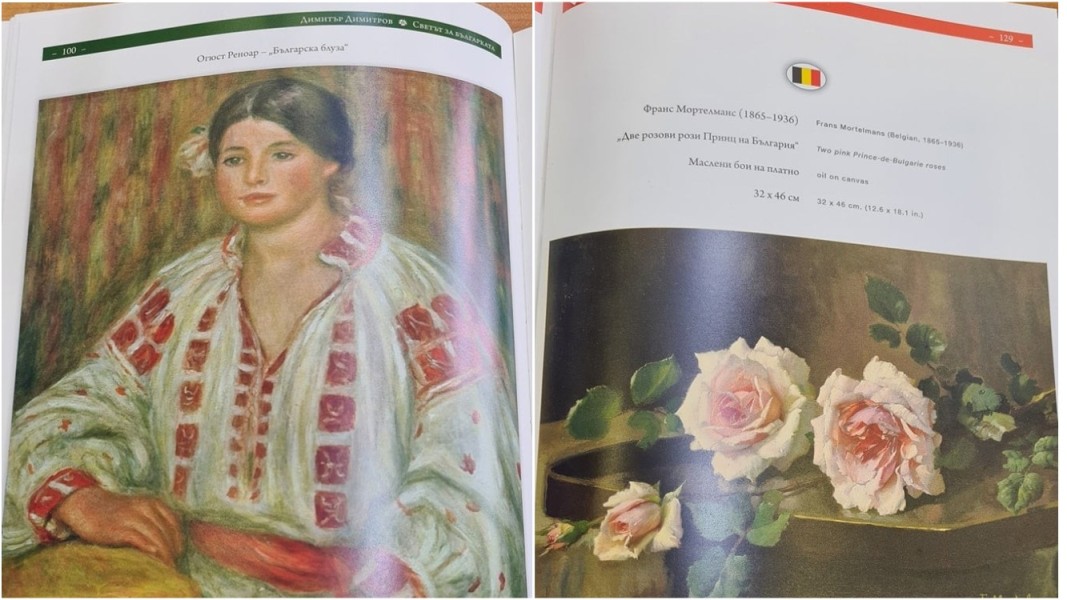Dimitar Dimitrov, a journalist with the BBC for many years, and, as he himself puts it a “Bulgarologist”, presented his new book in Sofia called “The world for the Bulgarian woman”.
The multilingual book is the first of a future series based on texts and illustrations from books, musical pieces, postcards and magazines, which make mention, in one form or another, of Bulgarian women, of their skills, appearance and attainments. The selection includes 15 publications, in different languages covering a period of six centuries. The subtitle is: April uprising. Roses, fashion, art, and it was invented by Dimitrov a long time ago – in the mid-1990s. Just as the series already in circulation “The world for the Bulgarian warrior”, the current “women’s” series is planned to comprise 4 books.
“The book begins with a quotation, and I would like to emphasize that everything in it is scanned from original sources in French, German, English. And that quotation concerns the year 1444, the time of the campaign by Vladislav Varnenchik (Władysław of Varna), which ended with the battle at Varna. The French book in question, published in the 19th century, makes mention of a Bulgarian fortune teller called Sekusa, who advised the king of Wallachia not to join the campaign. He did not heed her advice and history is what we know it to be.”

Dimitar selected the sources of the material in his book “The world for the Bulgarian woman” himself. His good command of French, German, English and even Swedish have been a great help in his search and in the translation of many of the texts.
“Let me mention a fascinating piece – in a French magazine from 1890 I found two pages about Bulgarian embroidery, describing the stitches, and it filled me with great respect for what Bulgarian women could do with a needle. There is a really interesting first page from a Danish magazine from 1877, during the Russo-Turkish war, which, instead of illustrations from the war, gives a drawing of rose-picking season in Bulgaria and makes mention of Shipka peak. Another family magazine in Denmark from 1890 shows a comb-making workshop on its front page – men processing horns, probably buffalo and ox horns, and fashioning them into combs for women. An English magazine from 1877 shows a goldsmith’s workshop in Sofia making casts for jewellery for women.”
The journalist is proud of the musical compositions dedicated to women in this country which he has been able to discover. One of them is from 1909, by a French composer. It is his dream to one day collect as many works as he can and bring them to life in a history concert. The first book from the series “The world for the Bulgarian woman” may begin with a 16th century quotation, but it ends firmly in the present day.
“On the last pages I have included actress Maria Bakalova, in the Arts chapter.”
In books 2, 3 and 4 of the series, Dimitar Dimitrov intends to present how the position of Bulgarian women has changed in the family and in society through the years, again according to international sources.
Interview by Mariana Gancheva, Hristo Botev channel, BNR
Editing by Vessela Krasteva
Photos: library
Exactly a month after the Bulgarian National Radio solemnly celebrated its 90th anniversary, history continues its dialogue with us, its authors. With a special event on February 25, the exhibition "90 Years of the Bulgarian National Radio - The Radio..
Exactly 3 years ago, on February 24, Russia’s invasion of Ukraine began – an event that woke up Europe 77 years after the end of World War II and called into question one of the main goals of the EU – preventing a new armed conflict on the continent...
The festive service for the consecration of the new Bulgarian Orthodox church in London is led by His Holiness Daniil , Patriarch of Bulgaria, who also officiated at the Ressurection Vespers on Saturday. Hundreds of lay people-official guests and..
Exactly a month after the Bulgarian National Radio solemnly celebrated its 90th anniversary, history continues its dialogue with us, its authors. With a..

+359 2 9336 661
